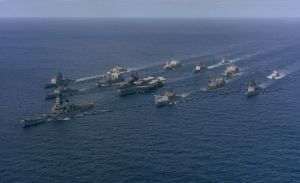
Bloomberg recently wrote that European officials are concerned that President Joe Biden could "nundge" Ukraine toward peace talks next year.
The same news agency wrote, less than half a year ago, that the American authorities were concerned about the possible success of President Xi Jinping's proposals to President Vladimir Putin during his visit to Moscow.
At the time, the United States was concerned that it would "be cornered on a Chinese peace proposal," and a rejection of the proposals would have allowed China to claim to other nations that "Washington is not interested in peace."
If in the case of the American authorities the problem was more of image and pride, for the European authorities a ceasefire and the start of peace negotiations represent a much more serious problem, especially if they will take place under the conditions imposed by Moscow.
The reason is simple: it would disappear, even if not immediately, one of the main justifications for the worsening of economic conditions, amid the maintenance of inflationary pressures at a high level, especially as a result of the resumption of the upward trend in energy prices.
European citizens will demand more and more explanations and solutions and will no longer be satisfied with justifications that boil down to blaming Vladimir Putin, especially against the background of intensifying economic difficulties and the expansion of the specter of stagflation in Europe.
In addition, Annalena Baerbock, Germany's foreign minister and one of the most ardent supporters of sanctions against Russia, recently admitted that they are not working.
"Economic sanctions should have an economic impact, but they don't, because the logic of democracies doesn't work in autocracies", Baerbock recently declared in an interview carried in the international press, proving, once again, that he has very good chances at the title of the most incompetent and inept European foreign minister, at least since the post-war period.
Since she has been in charge of Germany's Foreign Ministry, Annalena Baerbock has only exposed her serious deficiencies in education, especially in history and geography. So it should not surprise us that such a politician, along with the entire German government, could be "terrified" by the prospects of a peace agreement in Ukraine.
Peter Szijjarto, Hungary's foreign minister, recently pointed out that "the whole world laughs at the policy of European sanctions against Russia", and their failure must lead to "holding European officials accountable for their erroneous ideas".
And Szijjarto's statements seem to represent a rather serious argument for those who do not want an "outbreak" of peace in Ukraine. The louder the calls to fight until the final victory of Ukraine, regardless of the consequences, the greater the guilt, and so is the fear.
Unfortunately for the European authorities, victory is not achieved with slogans, statements of support or calls for solidarity, especially from those who will never be on the front lines.
The Bloomberg article shows that, after two months of counter-offensive, Ukrainian forces have made only "tactical advances", despite sending numerous units trained by the US and Europe into battle.
Promises to continue the fight are fundamentally dependent on arms and ammunition support from Ukraine's allies, but "officials admit that maintaining the current level of support is a very difficult task", given that "ammunition stocks are depleted and the production of The US and Europe will not be accelerated until the end of 2024", as the American news agency also writes. According to the Bloomberg article, the F-16 fighter jets probably won't arrive until next year either.
Amid the continuation of Russia's war of attrition, the nature of which only now seems to be becoming apparent to Western politicians and militaries, "America will be less and less interested in what is happening in Ukraine, and it will be more and more difficult for Europeans to convince Americans that Ukraine is an American problem," Samantha de Bendern, a research associate at the Royal Institute of International Affairs, told Bloomberg.
Isn't it ironic that after American officials have "convinced" the Europeans to sever all ties with Russia, the Europeans can be sent forward without any back support, especially after barking "heroically" like some hysterical chihuahuas, behind the American "big dog"?
Statements by anonymous officials taken by Bloomberg show that "continued US support is essential because Europe alone does not have the military capacity to bolster Kiev's forces."
Couldn't the Americans be persuaded to allow the Nord Stream gas pipelines to be reopened so that the Europeans can get cheap energy from the Russians to rebuild their defense industry and manufacture countless shells and missiles to be sent to Ukraine for the fight against Russia?
Bloomberg recalls that the US and Europe were optimistic at the start of the year about Ukraine's significant progress amid massive support, but "hope has been replaced by reluctant recognition that even advanced weapons and tactics are not enough to quickly defeat Russia's massive and capable defense".
In a recent editorial in The Telegraph, Gerard Araud, former French ambassador to the US, wrote that "Europe lives with the illusion that it is not over".
Araud emphasizes that "for the US, Russia is a regional power, a nuisance, but it is not in the center of their attention", and this is the reason why "the United States wants to end the war in Ukraine as soon as possible, so that it can prepare of a confrontation with the real threat, China".
Several recent statements by high-ranking US officials, particularly in Congress, support the French ambassador's claims.
But what if this just means that America is also living with a Europe-like illusion that it's not over yet?
















































